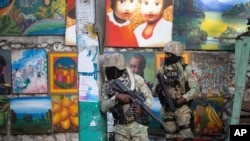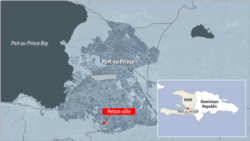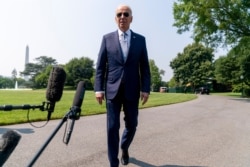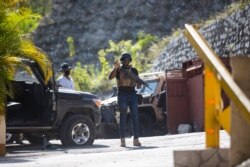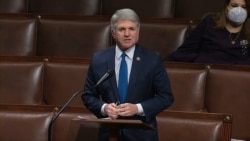Haiti is under a state of siege, interim Prime Minister Claude Joseph announced during a national address on state television Wednesday morning.
The announcement came hours after President Jovenel Moïse was assassinated by a group of unknown gunmen at his private residence in Pelerin, a wealthy suburb of the capital, Port-au-Prince.
Prime Minister Joseph said he is in charge of the country and has imposed martial law, as Haiti’s borders and its main airport closed.
U.S. President Joe Biden condemned the attack and expressed condolences in a statement issued by the White House.
"We condemn this heinous act, and I am sending my sincere wishes for First Lady Moïse's recovery. The United States offers condolences to the people of Haiti, and we stand ready to assist as we continue to work for a safe and secure Haiti," the statement said.
Biden called the attack “worrisome,” adding that "we need a lot more information" while responding to a reporter’s question before boarding Marine One enroute to Joint Base Andrews Wednesday morning.
Assassination details
The Haitian prime minister described the attack, which occurred about 1 a.m., as "highly coordinated" by a "highly trained and heavily armed group" whose members spoke in English and Spanish.
Moïse’s wife, Martine, was injured and taken to a hospital for treatment, Joseph said. One of the president’s children, who was at home during the attack has been taken to a secure location.
Joseph said the national police force is in control of the situation now and has taken measures to ensure the continuity of government, as well as to secure the nation.
Joseph urged the international community to investigate the murder.
"We also call on the international community to launch an investigation into the assassination and for the United Nations to hold a Security Council meeting on Haiti as soon as possible," he said in a statement emailed to VOA.
Joseph vowed to bring those responsible to justice.
US lawmaker reaction
On Capitol Hill, House Foreign Affairs Committee lead, Texas Republican Michael McCaul, released a statement condemning the killing and calling for a probe.
“I strongly condemn the assassination of Haitian president Jovenel Moïse and hope his wife who was injured in the attack recovers quickly. There must be a full investigation and appropriate accountability for his murder. My condolences to the Moïse family and people of Haiti.”
United Nations reaction
United Nations Security Council president, French Ambassador Nicolas de Riviere, said the council was deeply shocked by the assassination.
The council will meet privately Thursday morning to discuss developments.
“This is a critical moment. I think we all knew it was sensitive and difficult on the ground in Haiti,” Ireland’s ambassador Geraldine Byrne Nason told reporters. She said the council would discuss how it could support the people of Haiti.
“I think this is a dark hour for them, and we certainly want to be sure we can express our support for the people of Haiti,” she said.
The United Nations has about 1,200 staff in Haiti as part of its political mission there.
Recent uptick in violence
Haiti has been experiencing political instability and division, as well as a rise in gang violence.
Last week in Port-au-Prince, gang leader Jimmy Cherisier, who is known by the nickname Barbeque, took to the streets to protest Moise's government, calling on him to resign.
“Jovenel [Moise] must go!” Cherisier told reporters during the protest. “A new group of people needs to lead this country, and we must sit together around a table, have a national dialogue so we can redefine this country.”
Seeking to reassure the nation, the prime minister had appealed for calm.
“Stay calm, the nation is secure, let’s look for harmony,” he said.
Matiado Vilme and Yves Manuel in Port-au-Prince, White House correspondent Patsy Widakuswara, Capitol Hill correspondent Katherine Gypson, United Nations correspondent Margaret Besheer contributed to this report.




